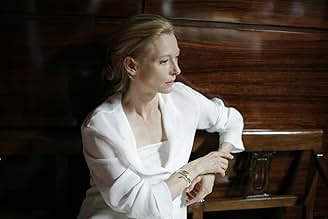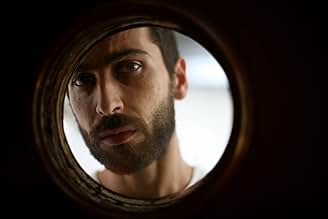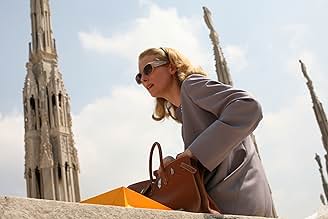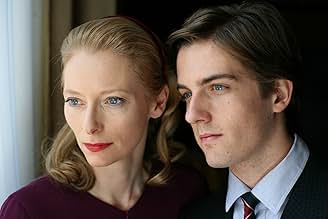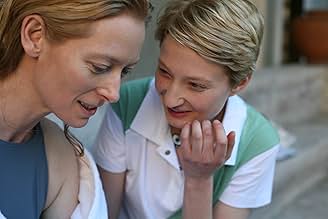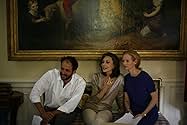Emma ha lasciato la Russia per vivere con il marito in Italia. Ora fa parte di una potente famiglia industriale ed è la stimata madre di tre bambini, ma si sente insoddisfatta. Un giorno Ant... Leggi tuttoEmma ha lasciato la Russia per vivere con il marito in Italia. Ora fa parte di una potente famiglia industriale ed è la stimata madre di tre bambini, ma si sente insoddisfatta. Un giorno Antonio, un talentuoso chef amico di suo figlio, risveglia i suoi sensi.Emma ha lasciato la Russia per vivere con il marito in Italia. Ora fa parte di una potente famiglia industriale ed è la stimata madre di tre bambini, ma si sente insoddisfatta. Un giorno Antonio, un talentuoso chef amico di suo figlio, risveglia i suoi sensi.
- Regia
- Sceneggiatura
- Star
- Candidato a 1 Oscar
- 16 vittorie e 47 candidature totali
Recensioni in evidenza
8/10
But if you like people more than stories. If you want to see film-making at its most graceful and organic and inventive, if you want a musical score that will turn a sidelong glance into an operatic overture, then this IS the movie for you. It is a baroque masterwork. A cathedral of a film. Cold as stone but inspiring the soul.
Tilda Swinton is a goddess. She says so little, but communicates so much. There's an entire ocean of emotion inside or her, spilling out of her eyes. I cried twice at this film. Once because of the subject matter and then again at the delicacy of the film-making. Don't let people with conservative tastes and conventional ideas of film and story tell you not to go see this movie. They are robbing you of experiencing pure emotive cinema.
"Something part palace, part prison, part museum" is how star and producer Swinton envisaged the house at the centre of this contemporary drama about the Recchis, a wealthy Milanese family. Opening with a series of almost monochrome shots of a snowbound Milan, Guadagnino closes in on the elegant but forbidding 1930s mansion, where Russian-born Emma (Swinton) and her husband Tancredi (Pippo Delbono) are preparing to host a dinner party.
On the surface, Emma is an attractive middle-aged woman, perfectly at ease with her three grown-up children and comfortable within the sumptuous trappings of Italian society. Guadagnino and cinematographer Yorick Le Saux linger over the chandeliers, wall hangings and gleaming napery that indicate decades of affluent living. But as the white-gloved lackeys hover over the birthday celebrations of ageing patriarch Edoardo, we sense that something – or someone – is about to shatter the family's much-prized unity.
Soon there is an announcement about the future of the family textile business, but it isn't the defining event of this opening set piece. Guadagnino's interest lies not in soap opera-style financial wrangling, but in how two of Emma's children unwittingly lead her towards a personal epiphany. First her daughter Betta (Alba Rohrwacher), a talented artist, causes a minor ripple by declaring that she's now more interested in pursuing photography. Emma's subsequent discovery of a heartfelt note inside a CD box reveals that Betta has fallen deeply in love – with a girl.
During the meal, a young man turns up looking for Emma's son Edo (Flavio Parenti). He awkwardly refuses to join the party, but it's clear that Antonio (Edoardo Gabbriellini) a handsome and supremely talented chef, has struck a chord with the lady of the house. So, as Edo eagerly makes plans to open a restaurant with his friend, Emma is drawn into a high-risk affair.
The power of Swinton's performance lies not in her mastery of Italian dialogue but in her gradual, unspoken surrender to passion, over the dictates of convention. This is a film in which speeches are, for the most part, far less important than the sense of underlying tension generated by John Adams's operatic score and Le Saux's restless camera work. Late in the film there's a sinuous tracking shot that follows Emma's impulsive descent to the basement kitchen for a stolen moment with her lover.
Guadagnino's willingness to take risks in the pursuit of what Swinton has called "pure cinema" is what distinguishes this film from other stories of forbidden love involving ladies who are old enough to know better. Epicureans will experience as frisson as Emma is seduced by Antonio's lovingly prepared prawn dish. The lingering shots of those seductive crustaceans could have been ridiculous, but they're another small and believable step in Emma's awakening to the possibility of a new love. When the action moves to the glorious countryside around San Remo, Emma allows Antonio to cut her hair, in an apparent nod to her daughter's recent change of style. Her rebellion reaches a crescendo in the extraordinary al fresco sex scene, shot in huge close ups to the accompaniment of teeming insect life that threatens to drown out everything else.
Guadagnino and Swinton first worked together on The Protagonists (1999) and this latest collaboration evolved over a period of nearly 11 years. It's too early to say whether they can be measured against some of their inspirations –Tolstoy, Flaubert , Hitchcock and Visconti – but there is much to admire in this stylish and well-acted drama.
There are faults: some of the camera placements are too artily self-conscious and Emma's interactions with her husband and children often feel rather perfunctory. Unlike Visconti's The Leopard, this isn't an in-depth exploration of family dynamics buckling under the forces of history. But neither the director nor the star can be accused of timidity in the way they embrace the protagonist's headlong rush towards her destiny. And even the Master of Suspense would have applauded the shocking climax of a confrontation in the garden, which made me jump out of my seat.
Milan. Winter. Upper-middle classes,Northern Italy. A dizzying array of people who all know each other and we don't.
Speaking about I Am Love, Tilda Swinton remarks, "Overcoming the idea of oneself, as created by society, has been one of my main interests since Orlando." In that earlier film, which was based on a novel by Virginia Woolf, Swinton's character self-reflected by seeing how society views her through different time periods and even a gender change. In I Am Love, Emma (Swinton) connects with love as a revolutionary force and throws off the shackles of a persona forced on her by circumstance.
I Am Love is unusual as an art film in that it is set in a world of exquisite luxury and good taste. It is not the simplistic attack on bourgeoisie we might at first expect. Working out the underlying moral fabric requires effort (but is richly rewarded). Love, or Emma, is no martyr to idealism. Revolution (of the social order) – or love – can only be justified by its success. Even the cinematic temptation to tragedy will extolled and then dashed through with a sword.
Russian-born Emma is Tancredi's wife. Tancredi co-inherits the family textile fortunes with his son Edo. Emma, although head of the household, is something of a show wife. With style and authority, but no clearly defined role in terms of business or of culture. The traditions and values of Tancredi's father for the former have maybe skipped a generation to the untried Edo. For the latter, to his sister and artist-photographer, Betta.
Secondary characters quickly provide clues to the theme. Edo's friend Antonio is an innovative, high class chef. Cuisine elicits a life-fulfilling passion in him for perfection and meaning. And Betta has a life of her own of which the parents suspect little. "Only you love me for who I really am," she tells Emma.
A superficial reading of I Am Love could leave the viewer with the impression of tragedy in which love has terrible consequences. It is essential to analyse what one actually sees (rather than a Hollywood ending that would have emphasised different points entirely). One can then imagine conversations over glasses of chablis, berating the section where the film goes 'oh so Lady Chatterley,' oblivious to how the film attacks that very same self-satisfied air of culture without visceral involvement. Even an interest in Swinton's breasts disguised by trappings of intellectual analysis. More lowbrow cinema-goers could feel even more frustrated at the 'missed opportunities' for histrionics, the emotional 'involvement' that comes from more manipulative screen writing.
I Am Love is social melodrama in the best traditions of Italian cinema. It lines up, surprisingly, more with works like L'avventura and that film's quest for self, than the compassionate criticism of an elite class in Il Gattopardo (The Leopard). In I Am Love, good taste and refinement is simply the medium for those with an ability and wherewithal to appreciate it – epitomised by Tancredi's father, his son, but perhaps not Tancredi himself. It carries no moral connotation. Empty shells on the other hand, form without substance, ultimately and unknowingly seeks its own destruction.
Tilda Swinton's career has forged a extraordinary path. In mainstream cinema, she has been hailed for work like Michael Clayton which, while impressive, hardly shows her skill in portraying worthwhile values (compared, say, to her portrait in Stephanie Daley). Or her powerhouse as an actress, in challenging cinephile gems such as The Man From London. I Am Love has potential to reach a wider, discerning audience, than her Bela Tarr movie, being shown not only in art house but as least one multiplex chain. It has an arresting, and rather beautiful romance at its heart, and one that becomes a striking metaphor for finding one's true course in life. It is ascetically 'thinking person's cinema' yet lovers of fine things can luxuriate in the sumptuous sets and costumes that inhabit art history and couture (Silvia Fendi, third generation of the famous luxury brand, was also an associate producer on the movie). Music is by Pulitzer Prize winning composer John Adams, and the perfectly choreographed closing scenes have almost operatic intensity.
One of the pleasures of writing a review is the opportunity to think a more deeply about the film - when one has to put words to paper. Only when forced to analyse the story, to separate the expected from what really happened, did I truly appreciate it. Swinton's Emma is no modern-day Madame Bovary. Style, plot and execution is far less predictable than it seems. Clichés of rich-poor, virgin-whore, as well as cinematic tropes that have become stale are effortlessly avoided. Confusing feelings are not indicated by fast cuts, but by unrelentingly staring at the character struggle in a long take.
I particularly like Swinton's power for creating interiorisation. This is visual acting at its best, showing what is going on in her head without having it spelt out. There are moments of exultation when she can barely contain herself. And moments when she struggles to stay on course – as we should, if we want to keep up. We find ourselves transfixed by her face in the bathroom. A place of privacy, where she can almost admit to herself the jubilation at a stolen kiss. And, like the art book she forgets to pay for, full of future portent. Or the moments when she is torn, at the climax of the film. The difficult self-examination in the midst of events. When Tancredi summons damnation in the words, "You don't exist," she has passed the point where she might cling to merely existing. Freedom is the power to 'go,' and to 'do.' Any avowedly lightweight cinemagoer might complain that the deaths are not dramatic enough. The cinematography not stark enough (to make us gasp in awe every few seconds at the beautiful surroundings) or the dialogue not self-explanatory enough.
Written by Barbara Alberti, Ivan Cotroneo, Walter Fasano and Guadagnino and based on a story by the director, the film begins in snowy Milan in the winter. The very wealthy Recchi family, owners of a textile factory that it is hinted supported Musolini and the Fascists during the war, is having a dinner party in their aristocratic house catered by a host of servants wearing white gloves. The elderly grandfather and patriarch of the family Edoardo Sr. (Gabrielle Ferzetti) is about to retire, evoking the Visconti film, The Leopard. Shockwaves roll throughout the gathering, however, when he names both his son Tancredi (Pippo Delbono) and his handsome grandson Edo (Flavio Parenti) as joint controllers of the business. Befitting the family's pride, when Edo tells the group that he has come in second in a race, the elderly patriarch says "The Recchis never lose." The Russian born Emma (Tilda Swinton) is Tancredi's wife and mother of three grown children, sons Edo and Gianluca (Mattia Zacarro), and artist and photographer daughter Betta (Alba Rohrwacher). Though on the surface she is a loyal and supporting wife and mother and has made a complete adjustment to the Italian bourgeois way of life, underneath there is a growing boredom and discontent as sensed by her servant Ida (Maria Paiato). We get a hint of this stirring when daughter Betta reveals to her that she is a Lesbian and is in love with a fellow classmate in England. The longing for adventure crystallizes further when she meets Edo's friend Antonio (Edoardo Gabbriellini) who is a master chef who is planning to open a restaurant with Edo.
Joining her mother-in-law Allegra (Marisa Berenson) and Edo's girl friend Eva (Diane Fleri) for lunch, Emma's senses are fully awakened while eating prawns prepared by Antonio. Passing through San Remo on a trip to Nice to attend an exhibition to which she has been invited by daughter Betta, Emma unexpectedly bumps into Antonio who eagerly invites her to view the restaurant site. Despite the fact that Antonio is probably 10 to 15 years younger than her, this chance encounter leads to a bursting forth of Emma's tightly controlled sexual inhibitions and a swirl of passionate lovemaking in the rustic countryside, their engaged body parts mirrored by close-up shots of flowers and insects in a very poetic but overly aestheticized manner.
Reminiscent of Ibsen's 1879 play The Doll's House, the main thrust of the film is the repression of an upper class woman who suddenly discovers that there should be more zest to her life, presumably triggered by her daughter's openness in discussing her sexual preference. The love affair, however, triggers many changes in the Recchi family, both economically and psychologically. Tancredi is forced to sell their business to an Indian investor who explains that "capitalism is democracy". The scenes in London with the financiers are very strong but are treated as a minor sub-plot with the emphasis quickly given over to the family's psychological distress.
When Edo puts two and two together and realizes his mother's sexual adventures with his best friend, the result is tragedy for the entire family, a series of events handled by the director in an involving but melodramatic fashion. Though Emma has been praised by some for the courage she shows in breaking away from a static marriage, one wonders if a greater courage would perhaps have been shown if she had gotten in touch with the love she once had for her husband, fulfilled her solemn oath, "till death do us part", and resumed her responsibilities as a caring mother. While I was moved by much of the visual beauty of the film and the idea of breaking with tradition and listening to the voices within, I was infrequently emotionally involved with the characters and I Am Love felt distant and often contrived.
Director's Trademarks: The Films of Luca Guadagnino
Director's Trademarks: The Films of Luca Guadagnino
Lo sapevi?
- QuizLead actress Tilda Swinton learned both Italian and Russian for the part, neither of which she spoke before filming.
- BlooperWhen Edoardo and Elisabetta meet in London, there's a lot of shadow on the pavement. When they walk away together in the next shot, there's a lot more sun. But the weather can change quickly in the UK.
- Citazioni
Elisabetta Recchi: Happy is a word that makes one sad.
- ConnessioniFeatured in At the Movies: Venice Film Festival 2009 (2009)
I più visti
- How long is I Am Love?Powered by Alexa
Dettagli
- Data di uscita
- Paese di origine
- Siti ufficiali
- Lingue
- Celebre anche come
- Yo soy el amor
- Luoghi delle riprese
- Villa Necchi Campiglio, Milan, Lombardia, Italia(Recchis' villa)
- Aziende produttrici
- Vedi altri crediti dell’azienda su IMDbPro
Botteghino
- Budget
- 3.600.000 € (previsto)
- Lordo Stati Uniti e Canada
- 5.005.465 USD
- Fine settimana di apertura Stati Uniti e Canada
- 121.504 USD
- 20 giu 2010
- Lordo in tutto il mondo
- 12.747.768 USD
- Tempo di esecuzione2 ore
- Colore
- Mix di suoni
- Proporzioni
- 1.85 : 1
Contribuisci a questa pagina





